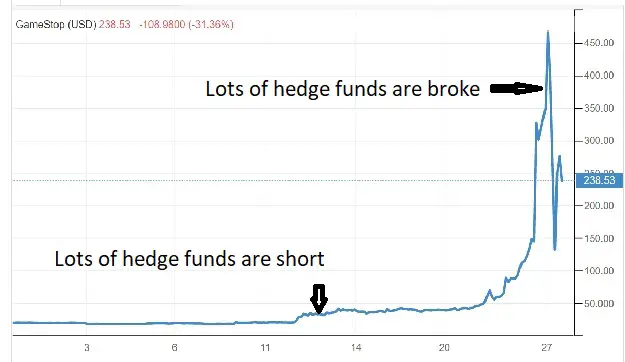When Predator Becomes Prey
Wall Street traders have traditionally played hardball with each other. They’ll take a position and then “talk their book” on CNBC, or short a competitor’s favorite stock while spreading negative rumors about it or do any number of other ethically-dubious things to profit at the expense of their peers. When they end up on the losing side of such a scheme they don’t like it, but they understand that this is how the game is played.
Then the game changed. The government sent billions of dollars of COVID relief checks to video game playing Millennials who had just discovered stock trading apps like Robinhood that allow customers to trade for free. And – no surprise for people who have been organizing cooperative video game raids their entire lives – these newborn daytraders figured out that by targeting heavily-shorted stocks and buying them en masse, they can force hedge fund short sellers into a panicked short squeeze, sending the target stocks through the roof. Et voila, easy money, over and over with no apparent end in sight – all at the expense of the market’s former top predators. It’s as if the Super Bowl audience started rushing the field and tackling Tom Brady for a loss – on every play.
GameStop (GME), a moribund bricks-and-mortar video game retailer (and thus a familiar name for Millennials) was the test case. A few weeks ago, packs of Robinhood traders sent the price from around $10 to over $450. Imagine being short that stock with millions of dollars of other people’s money, and you’ll understand Wall Street’s angst.

Now consider that these hedge-fund-hunting wolf packs can do this with any thinly traded, heavily shorted stock — and that the government is getting ready to send them another round of stimulus checks – and suddenly the threat looks existential.
This video illustrates the kind of furor that has been stirred up so far:
Now, it would be a huge surprise if Wall Street didn’t come back swinging. And come back it has. Yesterday, Robinhood and several other stock trading platforms shut down trading in the Millennials’ favorite stocks, while hedge funds are still allowed to trade. Those stocks are plunging, trapping panicked Millennials into losing positions.
However, allowing one group of people to trade stocks while banning others seems just a little bit unconstitutional, so opposition from across the political spectrum is lining up. Here are the last few paragraphs of a CNBC article from earlier today:
Rep. Alexandria Ocasio-Cortez weighed in on Twitter, calling Robinhood’s new parameters “unacceptable.”
“We now need to know more about @RobinhoodApp’s decision to block retail investors from purchasing stock while hedge funds are freely able to trade the stock as they see fit,” she tweeted. Republican Senator Ted Cruz tweeted “fully agree” in response to Ocasio-Cortez.Law firm ChapmanAlbin LLC announced Thursday it is “investigating claims on behalf of Robinhood users that were affected and suffered losses as a result of investing in Gamestop or AMC through the Robinhood brokerage platform.”
This could end up as one of those epic court battles that illustrate the fundamental divide between the ruling class and the rest of us. Can’t wait.




Shorting has always seemed to be a serious and somewhat sadistic gamble, and so the smell of the present situation is mixed. The one thing that I see as totally missing is the answer as to who will be buying the shares that have become so very high priced? The profit from having those shares comes from the selling, at least unless they pay excellent dividends. And the fact is that when the rise slows or stops, suddenly those wanting to buy will be those wanting to watch. So while the rapid run-up of shares is really hard on the shorts group, it seems that when the momentum fades it will be an expensive education for those who expected to sell at the high prices. It is usually quite difficult to sell "high" when nobody wants to buy at the high price.